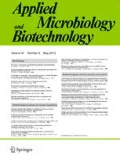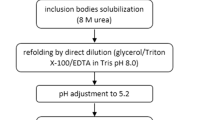Abstract
Human granulocyte colony-stimulating factor (hG-CSF) is a cytokine that regulates the proliferation, maturation, and differentiation of precursor cells to neutrophils. In the present study, we report the feasibility of inducing recombinant hG-CSF expression (rhG-CSF) in a pET vector system by combinatorial induction using low-concentration ethanol, IPTG, and lactose and auto-induction media (AIM). The coding sequence of hG-CSF transcript variant 2 was expressed in pET14 vector, and the effect of combinatorial induction was analyzed on inclusion body (IB) formation, biomass, protein purification, and bioactivity. Results showed that there was an inverse relationship between the temperature and soluble expression of rhG-CSF. Three-step washing with Triton-X, 2 M, and 5 M urea resulted in the maximum recovery of IBs. Combinatorial single-spike induction with IPTG, ethanol, and lactose in a batch culture led to a 3-fold increase in the expression of rhG-CSF. It was also observed that low concentration of ethanol (1–3% v/v) could be used in lieu of IPTG for inducing the rhG-CSF protein expression without adversely affecting biomass production. A 2.4-fold increase in productivity was obtained in LB-AIM media with combinatorial ethanol induction, and the overall yield of 2.8 g/L rhG-CSF was found. The purified rhG-CSF was bioactive and increased the cellular proliferation of umbilical cord blood-derived mesenchymal stem cells (U-MSC) by 29%. In conclusion, our study shows that combined ethanol induction can enhance the expression of rhG-CSF with three-step washing for recovery of the proteins from IBs and a single-step purification of rhG-CSF by affinity chromatography.
Key points
• Low concentration of ethanol (1–3%) could be used in lieu of IPTG for inducing rhG-CSF expression.
• Combinatorial single-spike induction with IPTG, ethanol, and lactose improved rhG-CSF expression.
• Purified rhG-CSF was bioactive and increased the proliferation of U-MSC.




Similar content being viewed by others
References
Alonso Villela SM, Kraïem H, Bouhaouala-Zahar B, Bideaux C, Aceves Lara CA, Fillaudeau L (2020) A protocol for recombinant protein quantification by densitometry. Microbiologyopen 9:1175–1182. https://doi.org/10.1002/mbo3.1027
Babaeipour V, Khanchezar S, Mofid MR, Abbas MPH (2015) Efficient process development of recombinant human granulocyte colony-stimulating factor (rh-GCSF) production in Escherichia coli. Iran Biomed J 19:102–110. https://doi.org/10.6091/ibj.1338.2015
Basu T, Poddar RK (1994) Effect of ethanol on Escherichia coli cells. Enhancement of DNA synthesis due to ethanol treatment. Folia Microbiol Off J Inst Microbiol Acad Sci Czech Repub 39:3–6. https://doi.org/10.1007/BF02814520
Basu T, Poddar RK (1997) Over expression of inducible proteins in Escherichia coli by treatment with ethanol. IUBMB Life 41:1093–1100. https://doi.org/10.1080/15216549700202171
Burgess RR (2009) Refolding solubilized inclusion body proteins. Methods Enzymol 463:259–282. https://doi.org/10.1016/S0076-6879(09)63017-2
Chen R (2012) Bacterial expression systems for recombinant protein production: E. coli and beyond. Biotechnol Adv 30:1102–1107. https://doi.org/10.1016/j.biotechadv.2011.09.013
Chhetri G, Kalita P, Tripathi T (2015) An efficient protocol to enhance recombinant protein expression using ethanol in Escherichia coli. MethodsX 2:385–391. https://doi.org/10.1016/j.mex.2015.09.005
Choi JH, Keum KC, Lee SY (2006) Production of recombinant proteins by high cell density culture of Escherichia coli. Chem Eng Sci 61:876–885. https://doi.org/10.1016/j.ces.2005.03.031
Crane AM, Jansen R, Andrews ER, Ledley FD (1994) Cloning and expression. J Clin Invest 629:623–629. https://doi.org/10.1006/prep.2000.1374
Dehaghani SA, Babaeipour V, Mofid MR, Divsalar A, Faraji F (2010) An efficient purification method for high recovery of recombinant human granulocyte colony stimulating factor from recombinant E. coli. Int J Environ Sci Dev 1:111–114. https://doi.org/10.7763/ijesd.2010.v1.22
Dietrich A, Janowski B, Schäffner J, Blaschke UK (2017) Method for the purification of G-CSF
Do BH, Ryu HB, Hoang P, Koo BK, Choe H (2014) Soluble prokaryotic overexpression and purification of bioactive human granulocyte colony-stimulating factor by maltose binding protein and protein disulfide isomerase. PLoS One 9:e89906. https://doi.org/10.1371/journal.pone.0089906
Dvorak P, Chrast L, Nikel PI, Fedr R, Soucek K, Sedlackova M, Chaloupkova R, de Lorenzo V, Prokop Z, Damborsky J (2015) Exacerbation of substrate toxicity by IPTG in Escherichia coli BL21(DE3) carrying a synthetic metabolic pathway. Microb Cell Factories 14:201. https://doi.org/10.1186/s12934-015-0393-3
Fernández-Castané A, Caminal G, López-Santín J (2012) Direct measurements of IPTG enable analysis of the induction behavior of E. coli in high cell density cultures. Microb Cell Factories 11:11. https://doi.org/10.1186/1475-2859-11-58
Fox BG, Blommel PG (2009) Autoinduction of protein expression. Curr Protoc protein Sci Chapter 5:Unit-5.23. https://doi.org/10.1002/0471140864.ps0523s56
Gomes L, Monteiro G, Mergulhão F (2020) The impact of IPTG induction on plasmid stability and heterologous protein expression by Escherichia coli biofilms. Int J Mol Sci 21. https://doi.org/10.3390/ijms21020576
de Groot NS, Ventura S (2006) Effect of temperature on protein quality in bacterial inclusion bodies. FEBS Lett 580:6471–6476. https://doi.org/10.1016/j.febslet.2006.10.071
Hayat SMG, Farahani N, Golichenari B, Sahebkar A (2018) Recombinant protein expression in Escherichia coli (E.coli): what we need to know. Curr Pharm Des 24:718–725. https://doi.org/10.2174/1381612824666180131121940
Kaur J, Kumar A, Kaur J (2018) Strategies for optimization of heterologous protein expression in E. coli: roadblocks and reinforcements. Int J Biol Macromol 106:803–822. https://doi.org/10.1016/j.ijbiomac.2017.08.080
Lauber J, Handrick R, Leptihn S, Dürre P, Gaisser S (2015) Expression of the functional recombinant human glycosyltransferase GalNAcT2 in Escherichia coli. Microb Cell Factories 14:1–12. https://doi.org/10.1186/s12934-014-0186-0
Leleu X, Gay F, Flament A, Allcott K, Delforge M (2018) Incidence of neutropenia and use of granulocyte colony-stimulating factors in multiple myeloma: is current clinical practice adequate? Ann Hematol 97:387–400. https://doi.org/10.1007/s00277-017-3191-7
Li F, Vijayasankaran N, Shen A, Kiss R, Amanullah A (2010) Cell culture processes for monoclonal antibody production. MAbs 2:466–479
Mahmood T, Yang P-C (2012) Western blot: technique, theory, and trouble shooting. N Am J Med Sci 4:429–434. https://doi.org/10.4103/1947-2714.100998
Maji K, Dasgupta S, Bhaskar R, Gupta MK (2020) Photo-crosslinked alginate nano-hydroxyapatite paste for bone tissue engineering. Biomed Mater 15. https://doi.org/10.1088/1748-605X/ab9551
Marisch K, Bayer K, Cserjan-Puschmann M, Luchner M, Striedner G (2013) Evaluation of three industrial Escherichia coli strains in fed-batch cultivations during high-level SOD protein production. Microb Cell Factories 12:58. https://doi.org/10.1186/1475-2859-12-58
Papaneophytou CP, Kontopidis G (2014) Statistical approaches to maximize recombinant protein expression in Escherichia coli: a general review. Protein Expr Purif 94:22–32. https://doi.org/10.1016/j.pep.2013.10.016
Patra T, Gupta MK (2019) Cryopreservation of murine testicular Leydig cells by modified solid surface vitrification with supplementation of antioxidants. Cryobiology 88:38–46. https://doi.org/10.1016/j.cryobiol.2019.04.002
Petsch D, Anspach FB (2000) Endotoxin removal from protein solutions. J Biotechnol 76:97–119. https://doi.org/10.1016/S0168-1656(99)00185-6
Pushp P, Sahoo B, Ferreira FC, Sampaio Cabral JM, Fernandes-Platzgummer A, Gupta MK (2020) Functional comparison of beating cardiomyocytes differentiated from umbilical cord-derived mesenchymal/stromal stem cells and human foreskin-derived induced pluripotent stem cells. J Biomed Mater Res Part A 108:496–514. https://doi.org/10.1002/jbm.a.36831
Raso SW, Abel J, Barnes JM, Maloney KM, Pipes G, Treuheit MJ, King J, Brems DN (2005) Aggregation of granulocyte-colony stimulating factor in vitro involves a conformationally altered monomeric state. Protein Sci 14:2246–2257. https://doi.org/10.1110/ps.051489405
Rosano GL, Ceccarelli EA (2014) Recombinant protein expression in Escherichia coli: advances and challenges. Front Microbiol 5
Sahoo B, Dash S, Sankarnarayanan S, Mishra B, Guttula PK, Bhaskar R, Gupta MK (2020) Molecular modeling and co-expression analysis of human stem cell factor as fusion partner to granulocyte colony stimulating factor for improving their bioactivity. J Biomol Struct Dyn:1–15. https://doi.org/10.1080/07391102.2020.1796792
Sanchez-Garcia L, Martín L, Mangues R, Ferrer-Miralles N, Vázquez E, Villaverde A (2016) Recombinant pharmaceuticals from microbial cells: a 2015 update. Microb Cell Factories 15:33
Sandén AM, Prytz I, Tubulekas I, Förberg C, Le H, Hektor A, Neubauer P, Pragai Z, Harwood C, Ward A, Picon A, De Mattos JT, Postma P, Farewell A, Nyström T, Reeh S, Pedersen S, Larsson G (2003) Limiting factors in Escherichia coli fed-batch production of recombinant proteins. Biotechnol Bioeng 81:158–166. https://doi.org/10.1002/bit.10457
Schneier M, Razdan S, Miller AM, Briceno ME, Barua S (2020) Current technologies to endotoxin detection and removal for biopharmaceutical purification. Biotechnol Bioeng 117:1–22. https://doi.org/10.1002/bit.27362
Sheraba NS, Diab MR, Yassin AS, Amin MA, Alhamhoom Y, Zedan HH (2020) An efficient method for endotoxin removal from snake antivenoms. Chromatographia 83:779–787. https://doi.org/10.1007/s10337-020-03887-y
Sima S, Shafiee F, Jahanian-Najafabadi A (2020) Expression and one step intein-mediated purification of biologically active human G-CSF in Escherichia coli. Mol Biol Rep 47:2861–2869. https://doi.org/10.1007/s11033-020-05404-8
Singh A, Upadhyay V, Upadhyay AK, Singh SM, Panda AK (2015) Protein recovery from inclusion bodies of Escherichia coli using mild solubilization process. Microb Cell Factories 14. https://doi.org/10.1186/s12934-015-0222-8
Singha TK, Gulati P, Mohanty A, Khasa YP, Kapoor RK, Kumar S (2017) Efficient genetic approaches for improvement of plasmid based expression of recombinant protein in Escherichia coli: a review. Process Biochem 55:17–31. https://doi.org/10.1016/j.procbio.2017.01.026
Somani S, Padmanabhan S (2012) Process for purification of recombinant human granulocyte colony stimulating factor
Sun KM, Gupta MK, Shin JY, Jung YH, Lee HT (2011) Epigenetic modification of multipotent male germ-line. Stem Cells:124–124
Trivedi M, Martinez S, Corringham S, Medley K, Ball ED (2009) Optimal use of G-CSF administration after hematopoietic SCT. Bone Marrow Transplant 43:895–908. https://doi.org/10.1038/bmt.2009.75
Upadhyay V, Singh A, Jha D, Singh A, Panda AK (2016) Recovery of bioactive protein from bacterial inclusion bodies using trifluoroethanol as solubilization agent. Microb Cell Factories 15:100. https://doi.org/10.1186/s12934-016-0504-9
Vanz ALS, Renard G, Palma MS, Chies JM, Dalmora SL, Basso LA, Santos DS (2008) Human granulocyte colony stimulating factor (hG-CSF): cloning, overexpression, purification and characterization. Microb Cell Factories 7:1–12. https://doi.org/10.1186/1475-2859-7-13
Vemula S, Thunuguntla R, Dedaniya A, Kokkiligadda S, Palle C, Ronda SR (2015) Improved production and characterization of recombinant human granulocyte colony stimulating factor from E. coli under optimized downstream processes. Protein Expr Purif 108:62–72. https://doi.org/10.1016/j.pep.2015.01.010
Wurm DJ, Veiter L, Ulonska S, Eggenreich B, Herwig C, Spadiut O (2016) The E. coli pET expression system revisited—mechanistic correlation between glucose and lactose uptake. Appl Microbiol Biotechnol 100:8721–8729. https://doi.org/10.1007/s00253-016-7620-7
Zielińska J, Bialik W (2016) Recent changes on the biopharmaceutical market after the introduction of biosimilar G-CSF products. 12:144–152 . https://doi.org/10.5603/OCP.2016.0006
Funding
This work was funded by Department of Biotechnology (#BT/PR9535/AAQ/1/569/2013), Government of India.
Author information
Authors and Affiliations
Contributions
BM, GM, and BS performed the experiments; BM, GM, BS, and MKG analyzed the results; SJU and MKG conceptualized the work; BM and MKG wrote the manuscript; SJU and MKG reviewed the work. BM, GM, BS, SJU, and MKG reviewed and finalized the manuscript for submission. MKG provided resources and overall supervised the work.
Corresponding author
Ethics declarations
The authors declare that they have no conflict of interest.
Ethical statement
This article does not contain any studies with human participants or animals performed by any of the authors.
Additional information
Publisher’s note
Springer Nature remains neutral with regard to jurisdictional claims in published maps and institutional affiliations.
Electronic supplementary material
ESM 1
(PDF 147 kb)
Rights and permissions
About this article
Cite this article
Mishra, B., Murthy, G., Sahoo, B. et al. Combinatorial ethanol treatment increases the overall productivity of recombinant hG-CSF in E. coli: a comparative study. Appl Microbiol Biotechnol 104, 9135–9145 (2020). https://doi.org/10.1007/s00253-020-10899-z
Received:
Revised:
Accepted:
Published:
Issue Date:
DOI: https://doi.org/10.1007/s00253-020-10899-z




